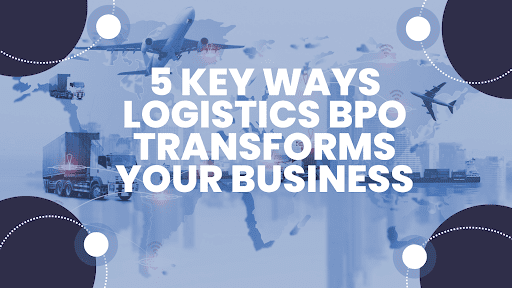Introduction:
Logistics businesses are always looking for ways to improve their operations. They want to save money, increase productivity, and stay ahead of the competition. One way to do this is through logistics BPO, or business process outsourcing.
Logistics BPO is when a company outsources some or all of its logistics operations to a third-party provider. This can include tasks such as warehousing, transportation, and customs clearance.
There are many benefits to logistics BPO. It can help companies save money. Third-party providers often have economies of scale that allow them to offer lower prices than in-house operations.
By way, shall we start this blog to explore the major key ways to transform business, to achieve your substantial saving and evolving the marketplace to drive your productivity. Let’s dive in!
Streamlined Documentation and Compliance Management:
In logistics, managing a vast array of documents and ensuring compliance with complex regulations is a time-consuming and resource-intensive task. Logistics BPO providers excel in this area, offering streamlined solutions for document management, trade compliance, and regulatory requirements. By outsourcing these functions, businesses can benefit from improved accuracy, faster processing times, and reduced errors. BPO providers have expertise in customs documentation, international trade regulations, and industry-specific compliance standards, ensuring smooth operations and minimizing the risk of penalties or delays.
Access to Specialized Skills and Expertise:
The logistics industry is multifaceted and ever-evolving, requiring specialized knowledge and skills to navigate its complexities. Logistics BPO providers bring deep industry knowledge, technical expertise, and best practices gained through years of experience. By partnering with these specialists, businesses gain access to a talent pool equipped with the latest industry trends, regulatory compliance requirements, and emerging technologies. This access to specialized skills and expertise enables companies to optimize their operations, make informed decisions, and stay ahead of the competition.
Advanced Supply Chain Visibility
Supply chain visibility is a game-changer in the logistics industry, enabling businesses to proactively manage inventory, track shipments, and respond swiftly to disruptions. Logistics BPO providers offer advanced visibility solutions that provide real-time tracking, event monitoring, and predictive analytics. By leveraging these technologies, you can gain insights into your supply chain, identify bottlenecks, and make data-driven decisions. The enhanced visibility offered by it not only improves operational efficiency but also strengthens customer satisfaction through accurate and transparent order tracking.
Efficient Freight Audit and Payment Processes:
Freight audit and payment is another critical area where logistics BPO can deliver significant value. They can also offer comprehensive reporting and analytics, empowering businesses to make data-driven decisions and optimize their freight spend. They will utilize the advanced technologies and automated processes to efficiently handle freight invoice validation, cost reconciliation, and payment processing. By processes, businesses can eliminate manual, error-prone tasks, streamline workflows, and reduce administrative burdens. The result is improved accuracy, faster payment cycles, and enhanced visibility into transportation costs.
Enhanced Technology Capabilities:
Logistics BPO providers stay at the forefront of technological advancements and invest in cutting-edge tools and platforms to deliver superior services. By partnering with BPO providers, businesses can leverage these enhanced technology capabilities without the burden of hefty investments in infrastructure and software solutions. From robust transportation management systems and real-time tracking platforms to data analytics and artificial intelligence-powered solutions, logistics BPO providers empower businesses with the tools needed to optimize their operations, drive innovation, and unlock new growth opportunities.
Scalability and Flexibility:
Logistics BPO offers the flexibility and scalability required to adapt to changing business needs and market dynamics. As your business expands or experiences fluctuations in demand, they can quickly adjust resources and capacity to meet your requirements. Whether you need to scale up during peak seasons or scale down during lean periods, it allows you to optimize resource allocation and maintain operational efficiency. Its inherent flexibility of it ensures that you can respond swiftly to market changes, seize opportunities, and stay ahead of the competition.
Customer Service Excellence:
Exceptional customer service is a key differentiator in the logistics industry. Logistics BPO providers can elevate your customer service game by offering dedicated teams of experts who specialize in customer support, order management, and issue resolution. These teams can handle inquiries, track shipments, and provide timely updates to customers, ensuring a seamless and satisfying experience. They can also offer multilingual support, 24/7 availability, and customized communication channels to meet the diverse needs of your customers. By outsourcing customer service functions, businesses can enhance customer satisfaction, build loyalty, and differentiate themselves in the marketplace.
Conclusion:
If you are a business in the logistics industry, logistics BPO can be a valuable tool for helping you save money, be more productive, and grow. can help businesses save money, be more productive, and grow. It does this by streamlining operations, giving businesses access to specialized skills and expertise, using advanced technologies, and being scalable and flexible. Moreover, outsourcing non-core functions enables companies to focus on their core competencies and strategic initiatives, unlocking new opportunities for innovation and success. Embracing it has the potential to transform your business and position it for a future of sustainable growth and profitability.



























